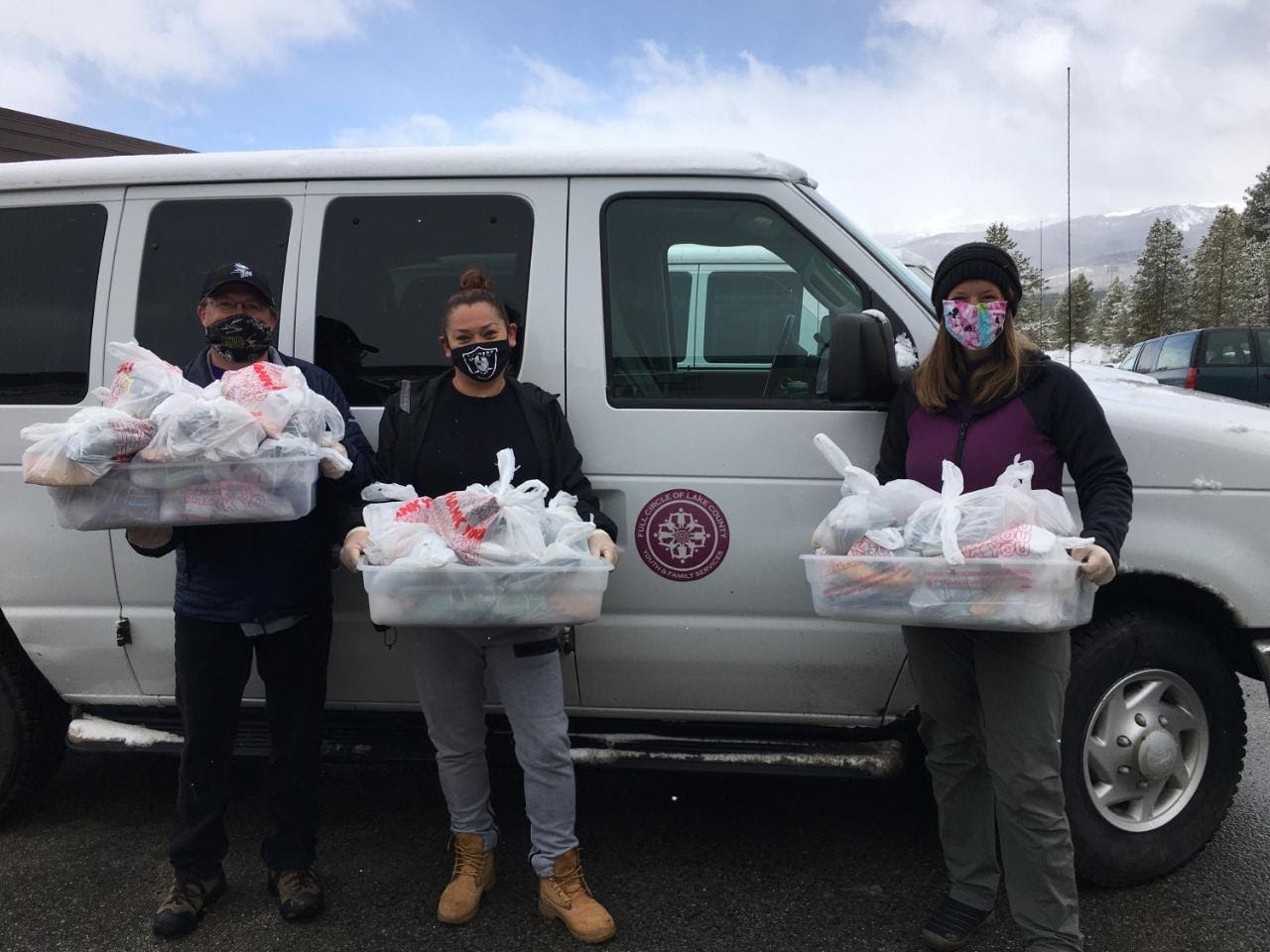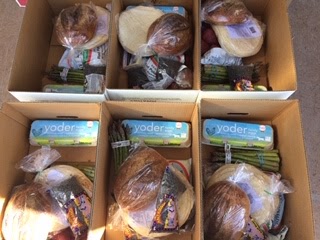As communities respond to the COVID-19 emergency, Colorado prevention programs are continuing to serve youth and families with commitment, care and a dash of creativity.
The Colorado Department of Human Services, Office of Behavioral Health funds prevention programs that aim to reduce rates of substance use disorder. Guided by prevention science, these programs lower risk by building protective factors--proven strategies that help children and teens bond with their families and communities.
Programs like Full Circle and Boys & Girls Club of the San Luis Valley, which operate out of Leadville and Alamosa respectively, typically host events, meetings and activities to shore up protective factors. But as the pandemic shut down in-person services in March, both organizations had to find innovative ways to keep the community connected.
Full Circle staff drop off meals to Lake County families. Partnering with other organizations, staff help distribute about 11,000 meals per week.
"Most of our work involves gathering people, so that's definitely been a huge shift," said Stephanie Cole, executive director of Full Circle. "The day we went remote, we really focused on relief efforts. It was quite a quick mobilizing of the community."
Full Circle offers a suite of programming for families, including after-school and mentoring programs for youth and immigrant integration services and coaching classes for parents. In the wake of closures, the organization teamed up with Lake County Build a Generation, a neighboring nonprofit, to ramp up response efforts.
Staff began by calling about 150 families and conducting a needs assessment, Cole said. From there, they signed up clients for federal and local assistance programs while putting together a community resource guide for families. When county emergency dollars dried up, Full Circle partnered with local organizations to launch an independent fund that has already covered phone, gas and other bills for dozens of families.
"Just within the Full Circle families, about 60 percent have reported loss of income due to COVID-19," Cole said. "It's really significantly hit our community. About 75 percent of the county leaves for work, and virtually all of those jobs have been lost."
As they help families meet basic needs, Full Circle staff are also adapting prevention programming. Staff drop off 700 craft kits a week so families can work on pinatas, pandemic time capsules, Easter egg baskets and more. Mentors and mentees play bingo with cards loaded with challenges and prompts, like writing a bucket list or having a critical conversation. The goal is to sustain connection without face-to-face meetings, Cole said.
"The team is just being really creative and trying to wrap our relief efforts with continued prevention and support work built in," she added.
The Boys & Girls Clubs of the San Luis Valley package lessons and conversation starters with every meal kit.
About 150 miles south, The Boys &, Girls Clubs of the San Luis Valley had to quickly rethink programming, too, said Christina Simonetti, grants and compliance manager of Boys & Girls Clubs in Colorado. Her office coordinates 17 independent Boys & Girls Club organizations that teach character building, leadership and healthy decision-making.
Boys & Girls Clubs are located in communities with higher rates of food insecurity and poverty, Simonetti said, and Club families like those from the San Luis Valley are even more vulnerable to economic shocks.
"Because it's a rural area, things are a little more dispersed," Simonetti said. "Transportation may be an issue, internet access be an issue. Staff really wanted to make sure basic needs were being met."
Like Full Circle, the San Luis Valley team also contacted families when closures began and heard food access was a pressing problem. They also knew juggling jobs and school was becoming a burden for parents, leaving less time to cook and enjoy dinner as a family. So the team worked with local vendors to curate and deliver meal kits to families.
"They had chicken sausage, sourdough bread, quinoa, salsa--all from local farmers and local business people," Simonetti said of the first delivery. "It was a way to both give back to the community, but also gather these ingredients that families may not have had access to before."
Each meal kit comes with a positive action lesson or conversation starter that families can discuss over dinner, prompting them to talk about marijuana use, for example. Staff have received positive feedback from members who struggle with broaching these tough topics, Simonetti said.
"It's allowed for deeper conversations, like conversations about what kids wanted to be when they grow up or goals they had that families didn't know about," she explained. "It's been really neat getting to see that."
Despite the challenges, the pandemic has allowed prevention providers to connect with the youth, their families and communities in new ways. Both Cole and Simonetti are proud of the way staff have stepped up, and they hope more clients will participate in their programs on the other side of the crisis.
"It's just been amazing to see how staff are putting the community at the forefront and figuring out how they can best support their community in the most holistic way," Simonetti said.
COVID-19 Resources for Parents and Caregivers
Online educational resources for parents during COVID-19 - Boys and Girls Clubs of America
Four Tips to Help Your Child Through the COVID-19 Crisis - COACT Colorado, Children's Hospital Colorado and Partners for Children's Mental Health
Talking to children about the pandemic - National Child Traumatic Stress Network (NCTSN)
Ways to Promote Children's Resilience to the COVID-19 Pandemic - Child Trends

